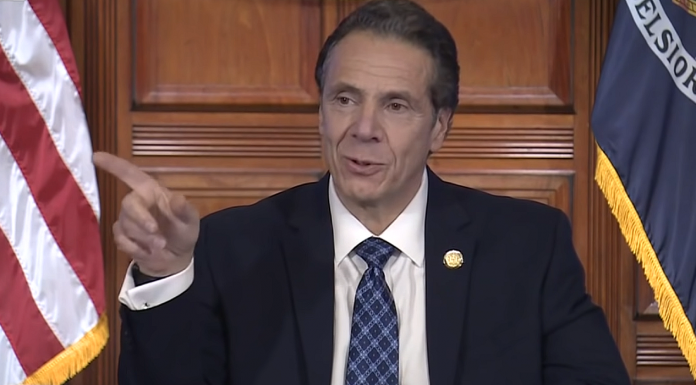When New York Gov. Andrew Cuomo, who presided over the worst of all US coronavirus outbreaks in his home state, took it upon himself to advise the mayor of Savannah, Ga., about “best practices,” many saw it as hollow political grandstanding.
But if Cuomo, a Democrat, is sincere in his desire to learn and exchange knowledge with his fellow civic leaders, North Carolina legislators recently made Fredo‘s big brother an “offer he can’t refuse.”
Phil Berger, president pro tempore of the North Carolina Senate, proposed that Cuomo head to Raleigh next for some lessons in fiscal discipline.
Even under the stewardship of a radical leftist governor, lawmakers there have been able to maintain the necessary reserves in unemployment funding by not treating their tax coffers as a magic money tree.
“North Carolina’s population is about half of New York’s (although that gap is shrinking because so many New Yorkers are moving to North Carolina) but our tax burden is just one-third of New York’s,” Berger wrote.
“Despite the fact that we extract so much less revenue from our population, North Carolina was able to build an unemployment reserve that’s nearly twice as large as New York’s,” he continued.
Cuomo has been an outspoken contrarian when it comes to President Donald Trump’s policies for addressing the coronavirus pandemic and the resulting economic fallout that continues to hobble the US economy.
He and his media allies initially sought to posture New York’s COVID management as a parallel alternative to Trump’s leadership, often holding dueling press conferences.
But Cuomo abandoned those efforts after it came to light that his policy of forcing nursing homes to co-mingle healthy and infected COVID patients, as well as failing to properly sanitize New York’s public transportation for months, had been key factors in the state’s unprecedented outbreak, pushing a 10-percent death toll compared with one below 4 percent nationwide.
Although the country leads the world in officially confirmed cases due to its large population, data transparency and widespread testing, the national death rate has been consistently below the global average, and the recovery rate continues to rise as treatment improves.
Nonetheless, Cuomo has continued repeatedly to send mixed messages about the crisis and to scapegoat the president while deflecting from his own culpability.
Meanwhile, Congressional Democrats, hoping to milk the economic crisis for another three months through Election Day, have likewise refused to play ball on another round of economic stimulus checks.
As with prior relief packages, House Speaker Nancy Pelosi, D-Calif., and Senate Minority Leader Charles Schumer, D-NY, sought to use the funds as leverage to enact their agenda wish-list items, including a bailout of fiscally irresponsible blue states.
The White House’s chief negotiator, Treasury Secretary Steven Mnuchin, has said such a bailout remains the only point of contention in the GOP’s good-faith negotiations.
Yet, Congressional Democrats have rejected his overtures to continue the talks until their Republican rivals commit up front to spending another trillion dollars or more.
Trump, instead, circumvented Congress by enacting several of the essential measures through executive action, although Democrats now threaten to sue to block their enactment.
The president’s orders included the stipulation that states wishing to extend federal funding for unemployment benefits must commit to paying a quarter of the cost. Much of that is projected to come from money the federal government already provided in the earlier stimulus packages.
Some states, however, flouted federal guidelines by extending benefits and stimulus payouts to illegal immigrants from their state budgets and now seek the federal funds to offset those expenses.
Cuomo’s New York is one of the states that stands to gain the most from the bailout. Rather than prioritizing emergency preparedness, he depleted state reserves while promising free health care for illegals.
The state also refused federal grants last year that would have given millions to hospitals under the condition that the hospitals stop actively promoting abortion as a birth-control solution.
But the already astronomical taxes—driven home by Trump’s closing of state and local tax loopholes that had allowed wealthy New Yorkers to avoid paying their fair share—along with the irresponsible fiscal spending, high cost of living and the state’s mismanagement of the health crisis—collectively led to a mass exodus of those who once propped up Cuomo’s financial house of cards.
Cuomo has since grown desperate, even offering in a recent press conference to “cook” for 1-percenters who choose to return and help foot the tax burden.
It is a far cry from Cuomo’s bizarre earlier boasts that the Empire State routinely bailed out other cash-strapped states with its contributions to federal taxes.
Berger cheekily flipped the script on Cuomo in his recent letter.
“North Carolina does not need to rely on a federal bailout to cover our expenses or to increase unemployment benefits to our citizens,” he said, “and it does not seem fair that you expect North Carolina taxpayers to fund your profligate spending habits.”

